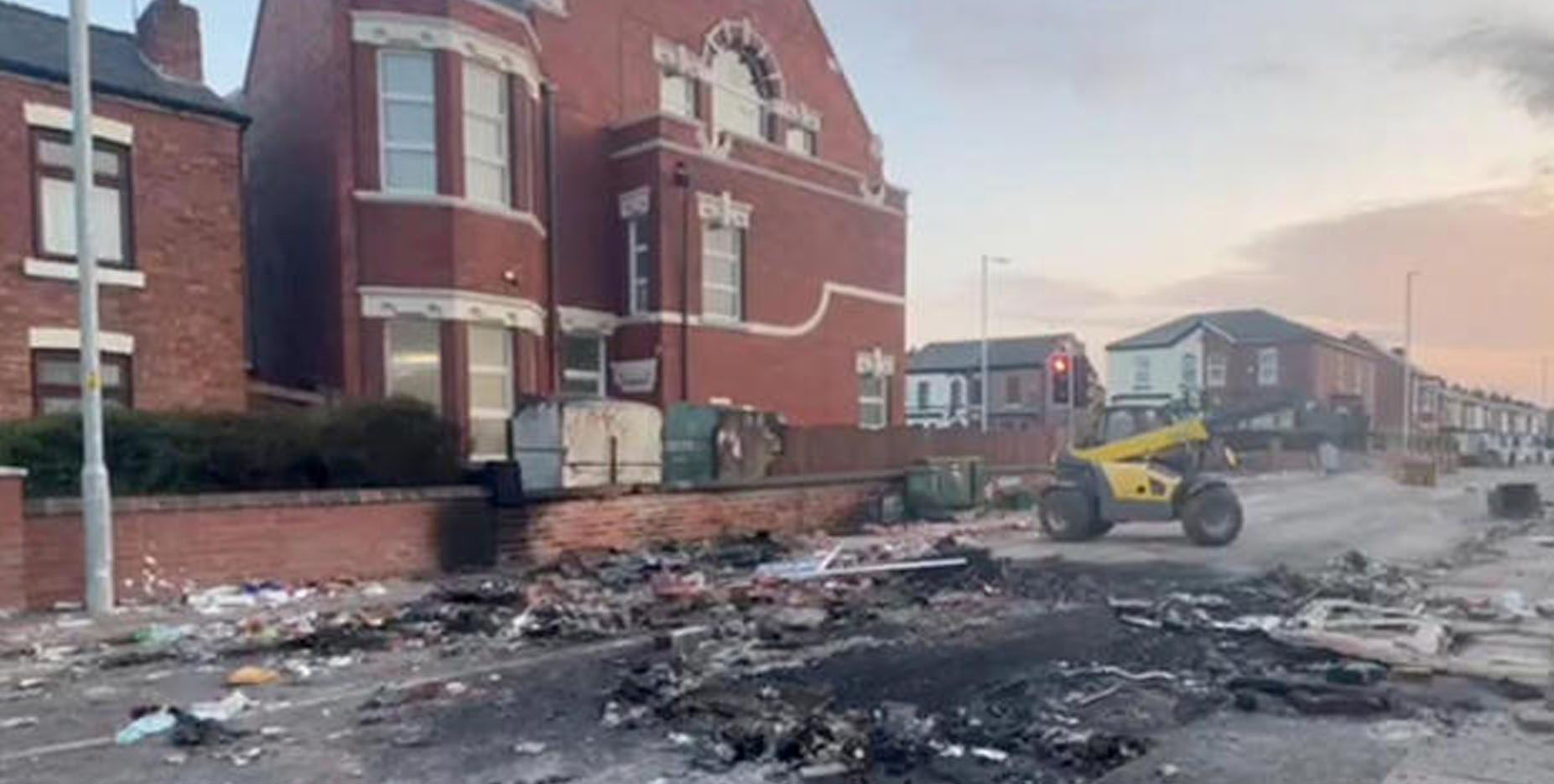
Photo: Debris from a fire scattered across the streets after an attempted arson attack on Southport Mosque. (Credit: Screengrab)
Last month in Southport, three girls were brutally murdered in a knife attack, a tragedy that shook the community. The following day, emotional vigils were held in their memory. However, what began as an outpouring of grief quickly turned into a wave of far-right violence. False claims that the suspect—a teenager arrested in connection with the stabbings—was an “Islamist” asylum seeker who had illegally arrived in Britain by boat in 2023, led to a dangerous escalation. By nightfall, hundreds of masked men, linked to the English Defence League (EDL), had surrounded Southport Mosque.
Armed with bricks and bottles, far-right extremists violently assaulted police officers, leaving several injured and setting a police van ablaze. Amid the chaos, some furiously chanted, “get them out,” directing their rage at the trapped imam and the eight others barricaded inside. It took a harrowing six hours, stretching into the early morning, for the terrified mosque staff to escape with a police escort, navigating through the shattered windows of the mosque, damaged fences, and the surrounding wall.
The far-right riots quickly spread to other cities across England and Northern Ireland, targeting mosques, Muslims, and immigrant-owned properties. Despite the clear pattern of Islamophobic and terrorist violence, the government only condemned the attacks as racist, failing to recognise the deeper sectarian motivations behind the chaos.
In England, the violence erupted near mosques and in predominantly Muslim neighbourhoods, targeting immigrant-owned businesses. Muslim-owned shops were set on fire, cars were vandalised, and hotels housing migrants were attacked, with attempts made to set them ablaze. On August 10, during far-right riots in Belfast, a petrol bomb was thrown at the Newtownards Islamic Cultural Centre on Greenwell Street in Northern Ireland, though it fortunately did not ignite. The rioters focused their violence on Muslims, their businesses, properties, and mosques across Belfast.
However, people of all colours and religions came out in support of Muslims and other ethnic minorities, standing against the far-right rioters. In many cities, the attackers were deterred when faced with large crowds of counter-protesters.
Following the attacks, Muslims across the country were on high alert, fearing additional violence against them and their mosques. Discussions in WhatsApp groups centered on protecting communities and criticised the Labour government for its lack of response. No government officials, including Prime Minister Keir Starmer, visited Southport Mosque to offer support after the attack.
The consensus among many Muslims was unmistakable—if a synagogue had been targeted, the government would have likely responded swiftly, with Starmer and other ministers promptly visiting to show their solidarity. The lack of support for Muslims has been a consistent issue, whether under the Labour government or the previous Conservative Prime Minister, both of which failed to address the surge in Islamophobic attacks following October 7.
What was even more shocking was Starmer’s refusal to acknowledge the attacks on Muslims, their businesses, and mosques as Islamophobic, choosing instead to label them merely as racist. During a visit to Belfast after the riots, Starmer reiterated this stance, a move that left many in the Muslim community feeling baffled. “The Prime Minister told us the attacks were racist. He did not use the word ‘Islamophobic.’ We explained to him that the attacks were Islamophobic because they only targeted Muslims. No one else was attacked,” explained Shibaji Miah, Chair of the Newtownards Islamic Centre, to The Muslim News.
If the riots were solely driven by racism, why were synagogues, mandirs, gurdwaras, and Buddhist temples largely unharmed, while mosques were desecrated and Muslim gravestones destroyed? The deliberate targeting of Muslims suggests that the violence was driven by specific religious and sectarian hatred, not just broad racial prejudice. Muslims expected the Labour government to recognise the Islamophobic nature of the attacks.
Starmer’s refusal to do so only reinforces the perception that Labour is no different from the Conservatives when it comes to addressing issues affecting Muslims. Would the Prime Minister have described attacks on synagogues as merely racist, or characterised the attempted mob assault on a barricaded rabbi and his staff as anything other than blatant anti-Semitic terrorism?
Starmer’s reluctance to recognise the riots as Islamophobic also casts doubt on whether he will embrace the APPG definition of Islamophobia and appoint an independent government adviser on the issue. It’s crucial to recognise that this violence was not just brutality—it was terrorism. Yet, the government, media, and politicians have avoided labelling these rioters as extremists or terrorists, even though their actions clearly fit the definition of terrorism: using violence to advance a political agenda.
Lee Anderson, Reform UK’s chief whip in the House of Commons, downplayed the violence, referring to the rioters as “young lads who probably had one too many, got involved with the wrong crowd, and started throwing stones and causing damage.” He insisted, “These are not far-right thugs; they’re just young idiots who got carried away.” However, if Muslims had been responsible for such actions—vandalising places of worship, setting fire to premises, including occupied buildings—the situation would likely be labelled as terrorism without hesitation. The reluctance to confront the true Islamophobic nature of this violence only exacerbates the sense of injustice.
READ MORE
Over 1,000 arrested in far-right riots targeting mosques, Muslim cemetery, and healthcare workers
London Mayor pledges support for mosques in wake of far-right riots
Report: Institutional racism fuels surge in violence against people of colour in UK